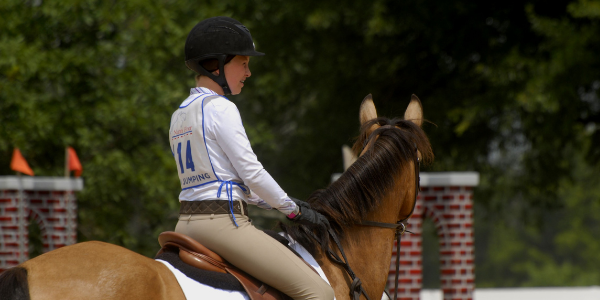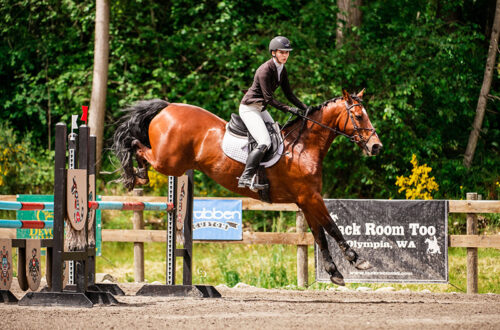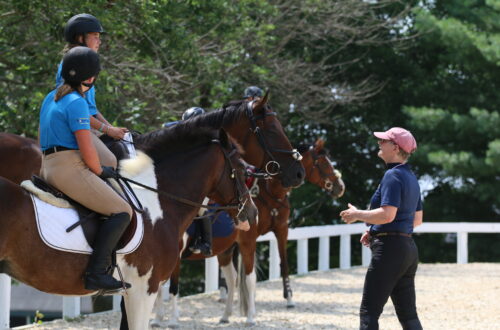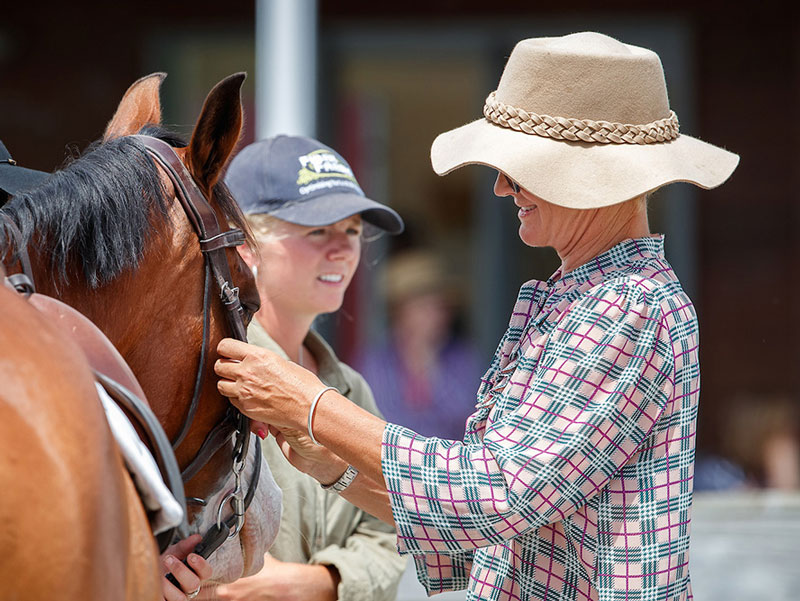
Dear Ema: Tough Shows, College or Not, Working Students, and Tips for USPC Championships
By Ema Klugman, Brought to You by Ride iQ
This column from Ema Klugman, brought to you by Ride iQ, will now be featured on the Pony Club Blog, with this month’s topics discussing what to do when training falls apart at a show, whether to go to college or go pro, tips for working students, and how to prep for USPC Championships.
Dear Ema,
I’m feeling stuck. All my peers on social media seem to be winning ribbons and succeeding in their competitions, and I can barely manage to get through an event on my pony without being eliminated. I ride every day, practice a lot, but then when we get to the show it all just falls apart. Should I just quit?
Sincerely,
Noah
Dear Noah,
Thanks for your honest question, and I’m sorry that you are feeling stuck and frustrated. At my very first event, I was technically eliminated for forgetting a jump on cross-country, and I’ve had plenty of falls and mishaps along the way. I’ve sometimes gotten frustrated or disheartened, but I’m glad that I’ve stuck with it. It is not an easy sport, and often there are more lows than highs.
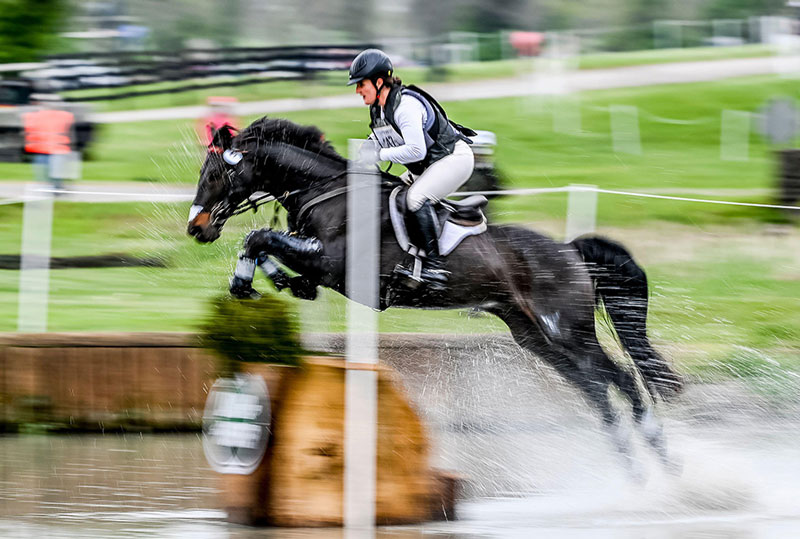
Photo Courtesy RideIQ
My first piece of advice is “No, don’t quit!” You might feel like that’s your only option right now, but trust me, you will be able to get through this.
I don’t know you or your pony, but I have a few tips that might help you move forward. First, do you have an instructor or trainer helping you? If not, you might want to try to find some help through your Pony Club or a local barn with an experienced trainer. They might be able to pinpoint the issues you are having and come up with good strategies to overcome them. For example, if your horse tends to stop at ditches, maybe you need a different strategy of approaching them so that you can get over them successfully.
Second, you mentioned that everything seems to be fine when you are practicing, but then it falls apart at the competition. That might be a function of show nerves, either from you or your horse, or both. Getting nervous is completely normal. Unfortunately, you just have to learn to cope with your nerves and direct them into positive energy. Someone told me once that if you get butterflies in your stomach, your job is to get them to fly in formation. Working with a coach or even a sports psychologist might help you get over this mental block.
Third, make sure you are competing at a level that is appropriate for you and your pony. Sometimes people compete at a level that is too advanced for their current skill level. A good rule of thumb is that you should be comfortably schooling one level above your competition level. So, if you are competing at Beginner Novice, you should be schooling Novice. Perhaps it makes sense to drop down a level in competition to have some confidence-building runs, and then you can try again at the level you are attempting now.
Don’t worry about what other people are doing on social media. Your journey is about you and your horse, and what you can achieve as a partnership. Take a break from competing to address the training issues you are having, and then jump back in there and give it your best shot.
Good luck,
Ema
Dear Ema,
I am a junior in high school, and I am considering whether to apply to college or try to be a professional rider after I graduate next summer. I really like riding horses, and I think I might want to make them my career. I have pretty good grades, but I don’t like school as much as I like going to the barn. What should I do?
Sincerely,
Amani
Dear Amani,
This is the dilemma so many young riders face. First of all, you are in a lucky position to consider going into horses full-time and also have the opportunity to go to college. I found myself in that position as well, and what I did was take a gap year. Gap years are not that common here in America, but in other countries they are almost the norm. Taking a year off between high school and college can allow you some more time and experience to figure out what to do.
Personally, I took my gap year to be a working student and really focus on my riding. I also worked a few non-horsey jobs and traveled internationally. It allowed me to see more of the world and think about what I wanted to do. I ended up going to college after that year, and there is no part of me that regrets it. I am still a professional rider, but I have another career path as well (I ended up going to law school as well), which offers me more security.
Even if you don’t take a gap year, you should realize that this choice does not need to be either-or. You can ride horses and pursue your education simultaneously. I competed on two horses at the Advanced level while I was in undergrad. You can think about creating ways to balance both things as well, like doing some of your schooling online or even going part-time.
The fact is that the horse world is really, really hard. Horse professionals often work seven days a week, rarely take a vacation, have little–to–no job security, and don’t have employer-sponsored health insurance or retirement benefits like most industries do. If your primary income comes from riding and training, getting injured, which is inevitable in the horse world, can be devastating financially. All in all, it is not an easy life—although many people do it. I would recommend going to college if you can, because it gives you another avenue to pursue besides horses, and often a much more stable income. That doesn’t mean you can’t ride at a high level—look at Lucy Latta, who works full-time for a beverage company but placed second at Badminton Horse Trials this year.
Life is all about tradeoffs. We can’t always do everything we want to do—at least not all at the same time! What I would recommend is that you go to college, which is an amazing opportunity and experience, and then you will have that degree as a fallback plan even if you decide to go into horses full-time.
Best of luck,
Ema
Dear Ema,
I am 14 years old, and I am going to be a working student for a Dressage rider this summer. I love Dressage, and I will be bringing my horse with me to this barn to hopefully improve and maybe compete this summer. What tips do you have for someone who is about to start their first working student position?
Sincerely,
John
Dear John,
Congratulations on your working student position. In my opinion, being a working student is the single most effective way of getting a great education in horses. I was a working student during every summer of high school and college (that is eight summers!) and the education I gained as an apprentice serves me well to this day.
Looking back on my working student days, I have a few pieces of advice to give:
1. Work hard.
Your hands should never be empty—if you find yourself with nothing to do, pick up a broom or a pitchfork and get going. Try to be efficient, and feel free to ask questions if you’re not sure how to do something. If there is an assistant trainer or groom at the barn, direct your questions to them first.
2. Be positive.
Like in any environment, negative energy in a barn environment can really bring down a whole team. Try to be friendly, positive, and helpful. You don’t want to be a drain on the system—you want to help make everything run smoothly.
3. Be clear on expectations.
Before you start, have a clear agreement with your boss about what she expects of you this summer. Does she want you to do stalls, help with turnout, tack up horses, hold them for the farrier and vet, and/or ride? She may ask you what you would like to do—if you have the luxury of this choice, think about what you enjoy most, and what areas you’d like to improve the most. I had a boss who asked me once whether I would prefer to mostly ride or mostly groom—I said that I wanted to ride. That answer led to some huge riding opportunities. You might not get that choice in every barn but be prepared to seize those chances if you get them.
4. Be open to learning.
Your new boss might do things differently than you have done them in the past. Have an open mind about training and horse management methods. For example, your boss might recommend that you ride your horse in a totally different way than you are used to. If that’s the case, give it a try! You are there to learn—and you are there because your boss has more experience and training than you do. Accept their suggestions, and you can always adjust how you do things when you get home. I think of my own riding and management techniques as a mosaic of different things I’ve learned from different people over time—I haven’t always adopted every suggestion a coach has given me, but I have made many of them my own. That’s the goal of education: self-reflection, curiosity, and independent thinking. This working student position has the potential to make you both a better horseman and a better rider. I hope you enjoy it!
Best of luck,
Ema
Dear Ema,
I am a C-1 Pony Club member, and I’m going to my first USPC Championships at Festival this summer. I am really excited but also nervous. What tips do you have for someone going to their first Pony Club Championships?
Sincerely,
Jennifer
Dear Jennifer,
It is so exciting that you qualified for, and will be attending, USPC Championships. Competing at Championships was one of my favorite experiences when I was growing up. Going to a big show and meeting other young riders from all over the country is an experience you won’t forget.
Here are a few tips to keep in mind as you prepare for Championships:
1. Remember that it is like any other rally.
You qualified for Championships with the rally in your discipline, so just think of the event as a more serious version of what you did to qualify. You need to be organized, communicate with your team members, and put your best foot forward.
2. Be a team player.
The week is long, and you should be prepared for the ups and downs as you go through it. Even if you don’t have the best competition personally, you should really support your fellow team members. You might be on a scramble team of other Pony Club members from different regions, and even if you don’t know them in advance, you should band together and support each other. There is no “I” in team.
3. Soak it all in.
For example, the Opening Ceremonies at Championships is one of the coolest experiences of the whole week. You will be representing your region at the ceremony, and you’ll also be able to meet so many interesting people. Yes, the week is a competitive experience, but it’s also a great way to make connections with others. As much as you can, go and watch people in other disciplines as they compete.
4. Take good care of your horse.
Depending on your horse’s experience level, this may be one of the biggest competitions they have ever done. There are a huge number of horses that head to Kentucky in July of every other year, and there is always a lot of commotion and atmosphere. Do your best to take really good care of your horse, particularly if you are traveling a long way to attend Championships.
5. Take care of yourself!
Championships is during one of the hottest times of the year. It is easy to go through the day and forget to take care of yourself. Make sure you are eating, drinking, and getting good rest throughout the week. You won’t be able to ride well if you get overheated. It is a good idea to have a cooler of snacks and drinks in your tack room to share with your team.
Best of luck. I have to say, I’m a little jealous!
Ema
Read more Dear Ema columns here. If you would like to submit a question for Ema Klugman to answer on Dear Ema, please email us at team@ride-iq.com.

About Ride iQ—An Official Partner of the United States Pony Clubs: Learn more about how Ride iQ, a mobile app with hundreds of audio riding lessons, including many Pony Club alumni and instructors. USPC and Ride iQ have partnered to identify which lessons are appropriate for each certification levels, offer exclusive deals to Pony Club members, and more. Learn more at www.ride-iq.com/pony-club.



